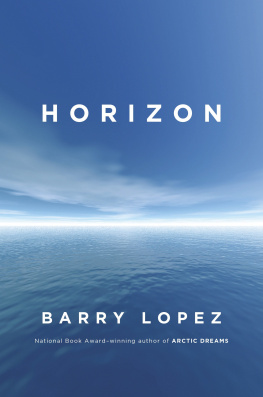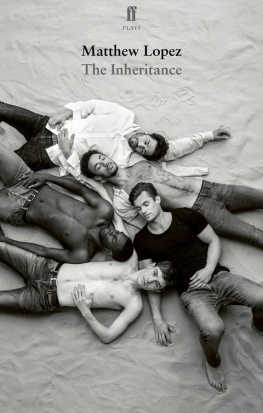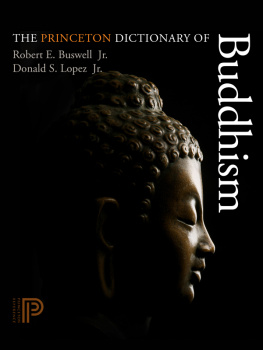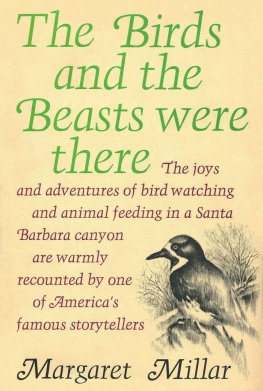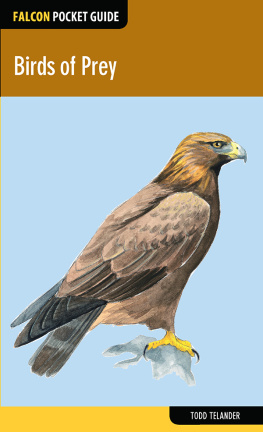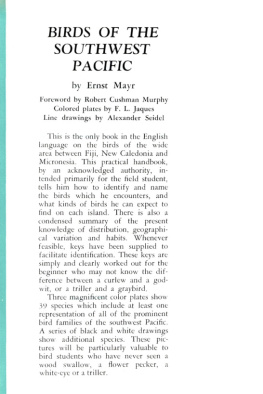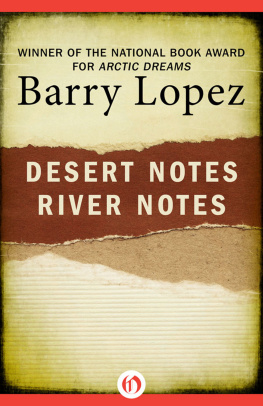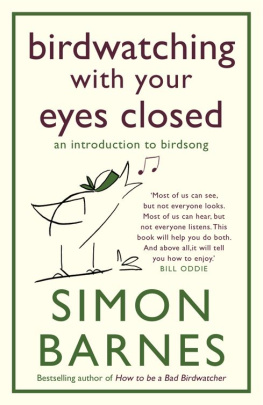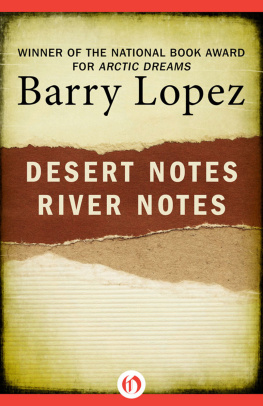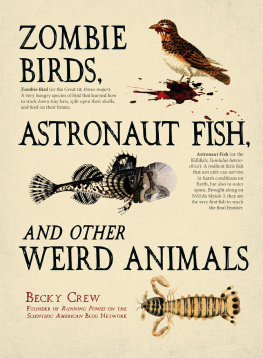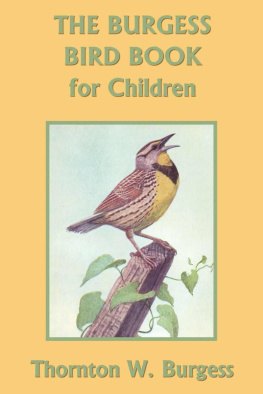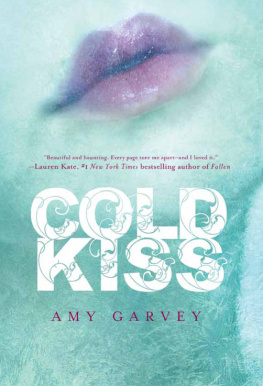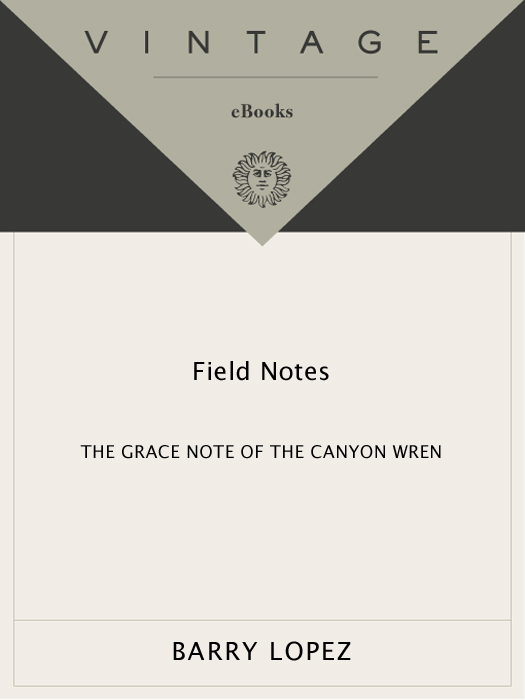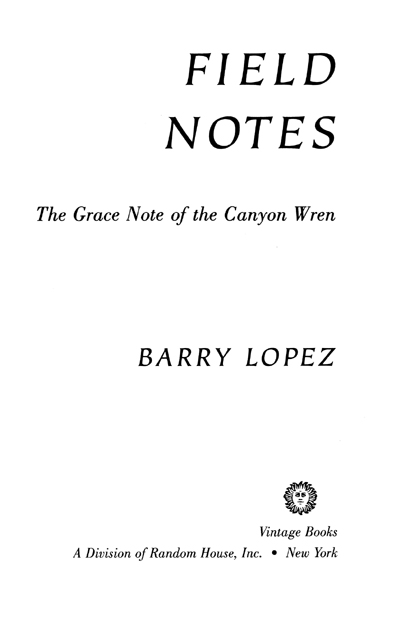Lopez succeeds in awakening our fleeting yearning and hidden feelings.
Lopez has such great narrative skill and uses his words so carefully the simple intensity is often nearly overwhelming.
[Lopezs] stories fierce beauty lingers in the minds eye like a foreign sunset.
Lopez displays his skill for description in writing thats precise, gorgeous, [and] arresting.
Barry Lopez is the author of six works of nonfiction and eight works of fiction. His writing appears regularly in Harpers, The Paris Review, Orion, and The Georgia Review. He is the recipient of a National Book Award, an Award in Literature from the American Academy of Arts and Letters, a Guggenheim Fellowship, and other honors. Lopez lives in western Oregon.
Books by Barry Lopez
NONFICTION
Arctic Dreams
Of Wolves and Men
FICTION
Light Action in the Caribbean
Lessons from the Wolverine
Field Notes
Crow and Weasel
Winter Count
River Notes
Giving Birth to Thunder, Sleeping with His Daughter
Desert Notes
ESSAYS
Apologia
About This Life
The Rediscovery of North America
Crossing Open Ground
ANTHOLOGIES
Vintage Lopez
FIRST VINTAGE BOOKS EDITION, JUNE 2004
Copyright 1994 by Barry Holstun Lopez
All rights reserved under International and Pan-American Copyright Conventions. Published in the United States by Vintage Books, a division of Random House, Inc., New York, and simultaneously in Canada by Random House of Canada Limited, Toronto. Originally published in hardcover in the United States by Alfred A. Knopf, a division of Random House, Inc., New York, in 1994.
Vintage and colophon are registered trademarks
of Random House, Inc.
Some of the stories from this work were originally published in the following publications: North American Review (The Entreaty of the Wiideema), Orion (Lessons from the Wolverine), and Outside magazine (Pearyland).
The Library of Congress has cataloged the Knopf edition
as follows:
Lopez, Barry Holstun, [1945]
Field notes : the grace note of the canyon wren / by Barry Lopez
1st ed.
p. cm.
I. Title.
PS3562.O67F54 1994
813.54dc20
94002144
eISBN: 978-0-307-80655-0
Author photograph David Littschwager
www.vintagebooks.com
v3.1
For
James F. Andrews (19361980)
For
A. Gunn, P. Morel, B. Taylor, and E. Tracy
and
Sue Hertel (19311993)
CONTENTS
INTRODUCTION:
WITHIN
BIRDS
HEARING
I am enfeebled by this torrent of light. Each afternoon seems the last for me. Hammered by the sun, mapless in country but vaguely known, I am like a desiccated pit lying in a sand wash. Hope has become a birds feather, glissading from the evening sky.
The journey started well enough. I left my home in the eastern Mojave twelve or fifteen days ago, making a path for the ocean. Like a sleek cougar I crossed the Lloma Hills, then the Little Sangre de Cristo Range. I climbed up out of the southernmost extension of White Shell Canyon without incident. Early on, the searing heat made me wary, brought me to consider traveling only at night. But, the night skies cast with haze and so near a new moon, it was impossible to find my way.
Today I thought it might rain. But it does not seem likely now. Its been more difficult to locate water than Ive known in the past, and that lack in this light and heat has added to my anxiety. Also, my grasp of how far I still have to travel is imperfect. This most of all fills me with dread.
In the distance, the stony, cactus-strewn land falls down into the drainage of the Curandera. I will turn north here this morning and hope to be in the wet canyon of the Oso by nightfall and down off this high blistered plain. From there, however far it may be, I know the river will flow to the ocean. Its comforting, each evening, to construe the ocean as my real destinythe smooth beach underfoot, round and hard like an athletes thigh, the ocean crashing, shaking off the wind, surging up the beach slope, all of it like wild horses. But, walking the Oso, I could come upon some sign that might direct me elsewhere, perhaps north into the Rose Peaks, into country I do not know at all.
Part of the difficulty of this journey has been having to feel my way like this. I departedmy body deft, tautwith a clear image of where I should go: the route, the dangers, the distances by day. But then the landscape became vast. Thinking too much on the end, I sometimes kept a pace poorly matched to the country. By evening I was winded, irritated, dry hearted. I would scrape out a place on the ground and fall asleep, too exhausted to eat. My clothing, thin and worn, began to disintegrate. I would awaken dreamless, my tongue swollen from thirst, and look about delirious for any companiona dog, a horse, another human being just waking up. But there was no one with whom to speak, no one even to offer water to. I spat my frustration out. I pushed on, resolute as Jupiters moons, breaking down only once, weeping and licking the earth.
I did not anticipate the ways in which I would wear out.
My one salvation, a gift I cant reason through, has been the unceasing kindness of animals. Once, when I was truly lost, when the Grey Spider Hills and the Black Sparrow Hills were entirely confused in a labyrinth of memory, I saw a small coyote sitting between two creosote bushes just a few yards away. She was eyeing me quizzically, whistling me up with that look. I followed behind her without question, into country that eventually made sense to me, or which I eventually remembered.
Another time, the eighth day out, I fainted, collapsing from heat and thirst onto the cobble plain through the blood shimmer of air. I was as overwhelmed by my own foolishness, as struck down by the arrogance in my determination as I was overcome by thirst. Falling, I knew the depth of my stupidity, but not as any humiliation. I felt unshackled. Released. I came back to the surface aware of drops of water trickling into my throat. I tried to raise an arm to the harrowing sun but couldnt lift the weight. I inhaled the texture of warm silk and heard a scraping like stiffened fans. When I squinted through quivering lashes I saw I was beneath birds.
Mourning doves were perched on my chest, my head, all down my legs, their wings flared above me like parasols. They held my lips apart with slender toes. One by one, doves settled on my cheeks. They craned their necks at angles to drip water, then flew off. Their gleaming eyes were an infants lucid pools.
Backed into this rock shelter, out of the suns first, slanting rays, I am trying to manufacture now a desire to go on, to step once again into a light I must stroke through. The light wears like acid and the heat to come will terrorize even lizards. It is not the desert of my childhood.


